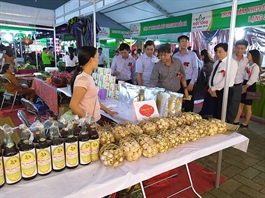Technology the key to advanced manufacturing sector
Technology the key to advanced manufacturing sector
The manufacturing sector is a driving force behind economic growth, but manufacturers are still outcompeted by foreign rivals when it comes to core technologies, according to insiders.

Pham Tuan Anh, Deputy Director General of the Industry Agency, Ministry of Industry and Trade (MoIT), attributed the technological inferiority to domestic firms' limited resources and an inadequate labour force.
He said the manufacturing sector has been developing asymmetrically with an overdependence on FDI firms. The economic over-representation of the firms can be observed visibly in the heavy industrial subsector.
The sector's reliance on imported materials compounds the situation, resulting in low value-added domestic products. Industrial transition over the past few years, undoubtedly, has been fueled largely by FDI firms rather than domestic ones.
The deputy director general called for favourable policies to keep firms well-informed about advanced technologies and facilitate the emergence of big firms, which act as a catalyst for an industrial leap forward.
He also said not only should the manufacturing sector be heavily invested but so should supporting industries, which supply the former with fuels, components and materials.
"We need favourable policies to help domestic industries, notably including textile, footwear and fishery, maintain their low-cost advantages and take the lead in the technological race," he added.
Nguyen Huu Tu, member of the Viet Nam Chemical Corporation's Board of Directors, revealed that the chemical industry is up to domestic demand in terms of basic products, but it is not the case for high-tech ones.
He took technical rubbers as an example, which domestic firms have a limited capability for mass-production. Imported rubbers, accordingly, have to come in to fill the demand gap.
"Domestic high-tech products still have ample room for growth," he said
The board member called for governmental Decision 726 to be implemented to accelerate the growth of the chemical industry. He also suggested a revision to tax policies to level the playing field for both domestic and imported fertilisers.
Lastly, he called for favourable policies on land rental in industrial parks and preferential loans for chemical producers to improve their competitive positions.
Dinh Quoc Thai, Secretary General of the Viet Nam Steel Association, revealed that the steel industry produces up to 30 million tonnes of steel per year. However, 90 per cent of the steel caters for building works, whereas just 10 per cent goes to other industries.
The disproportion can be attributed to the fact that some industries can not find certain types of high-quality steel near home. They have to rely on imported steel to feed their production.
The secretary general urged MoIT to draw up the Strategy for the Development of the Steel Industry until 2030 with a vision to 2050, which is expected to nurture the sustainable growth of domestic steel.
He also called for favourable policies to boost steel-consuming industries such as car component making, thereby raising the demand for the domestically-produced metal.

























